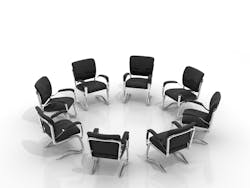Huddles should be an important part of each practice day. There are three purposes to the daily huddles: (1) solving anticipated problems before the day begins, (2) letting the team know where the practice stands in relationship to monthly goals and working together to come up with solutions to get back on track, and (3) acting as a bridge for staff to transition from their personal lives to the business day.
Let me note that not all practice owners set daily and monthly goals. As a consultant I believe this is a poor decision, but I realize it is each practice owner’s decision. Goals keep the owner and team focused and informed about their progress.
Huddle report form
I suggest you create a custom huddle form to use as an agenda at each huddle. It should include a section for monthly and daily goals, if applicable. You can add or subtract items from the form as the huddles evolve. The office manager or staff member running the huddle should fill in the form.
Goals
If you include monthly and daily goals, I recommend setting goals for each provider as well as for your overall collections and new patients. You will need to choose which statistics to use to set monthly and daily goals, whether it’s production, adjusted production, or collections. What works best varies from practice to practice. Once you decide which to use you must determine what the monthly and daily goals are for the practice and each provider.
Set monthly goals by averaging the practice’s and each provider’s production (or adjusted production or collections) for the last three months. Do the same for new patients. The goals should be at least 5%‑10% higher than the averages. The new-patient goal may or may not need to be targeted higher than the past three-month average. Set higher goals, but only as long as they are realistic for the team. Set daily goals by dividing the monthly goal for the practice by the number of working days for the current month. Ditto for each provider based on their number of working days.
Important huddle note: Do not allow office issues to be discussed. The huddle should be a no gripes and no complaints zone. You will never get through the huddle in 10 to 15 minutes if you allow people to complain. This will also turn the huddle into a downer that is hated by all, and it will fail.
Implementing the huddle
Huddles are typically held in the morning before the team sees patients. Once you smooth out the wrinkles, the huddle should be done in 10-15 minutes provided all needed data is ready before starting the huddle. Someone from the front desk must have all the needed front desk data ready before the huddle. The schedule and all charts need to be available. Often, assistants and hygienists bring the following patient information to the huddle—pending treatment, pre-medication information or other pertinent medical info such as allergies, and patients who need additional x-rays.
If the team is tracking daily goals, providers should bring their previous day’s statistics for entry on the form. If overall collections and new patients are tracked, the office manager or an assigned front office person should report total daily collections and new patients.
The huddle should never be run by the practice owner, but the owner should be present as he or she may need to provide vital data. Non-attendance by the owner sets a bad example and diminishes the importance of the huddle.
The huddle should be run by the office manager, or individual staff members, such as assistants, hygienists, and associates, can run it for the week. Rotate weekly through all staff. This option increases responsibility among all staff members and decreases the office manager’s workload. I recommend having each employee run the huddles. This way the practice owner or office manager can act as a “traffic cop” to keep the huddle moving along. A well-run huddle is not just about goals, targets, and collections. It is also about providing superior customer service.
Kevin Tighe, Cambridge Dental Consultants CEO, got bitten hard by the business and marketing bug during long summer days working at his dad's Madison Avenue ad agency. After joining Cambridge as a seminarist in the mid-1990s, Kevin went on to become Cambridge’s senior consultant and eventually CEO. Cambridge Dental Consultants is a full-service dental practice management company offering customized dental office manuals. Frustrated? High overhead? Schedule a chat with Kevin at [email protected].
About the Author

Kevin Tighe
Cambridge Consulting
Kevin Tighe, BA, is CEO of Cambridge Dental Consultants and a contributor to DentistryIQ, AGD Impact, DentalTown, DrBicuspid, and JADA. A Rhodes Preparatory School and Boston University graduate, he has authored the Ultimate Dental Office Manuals (2025 update), supporting thousands of dental professionals with modern tools and compliance. Explore the manuals at mydentalconsultant.com/employee-manuals.
